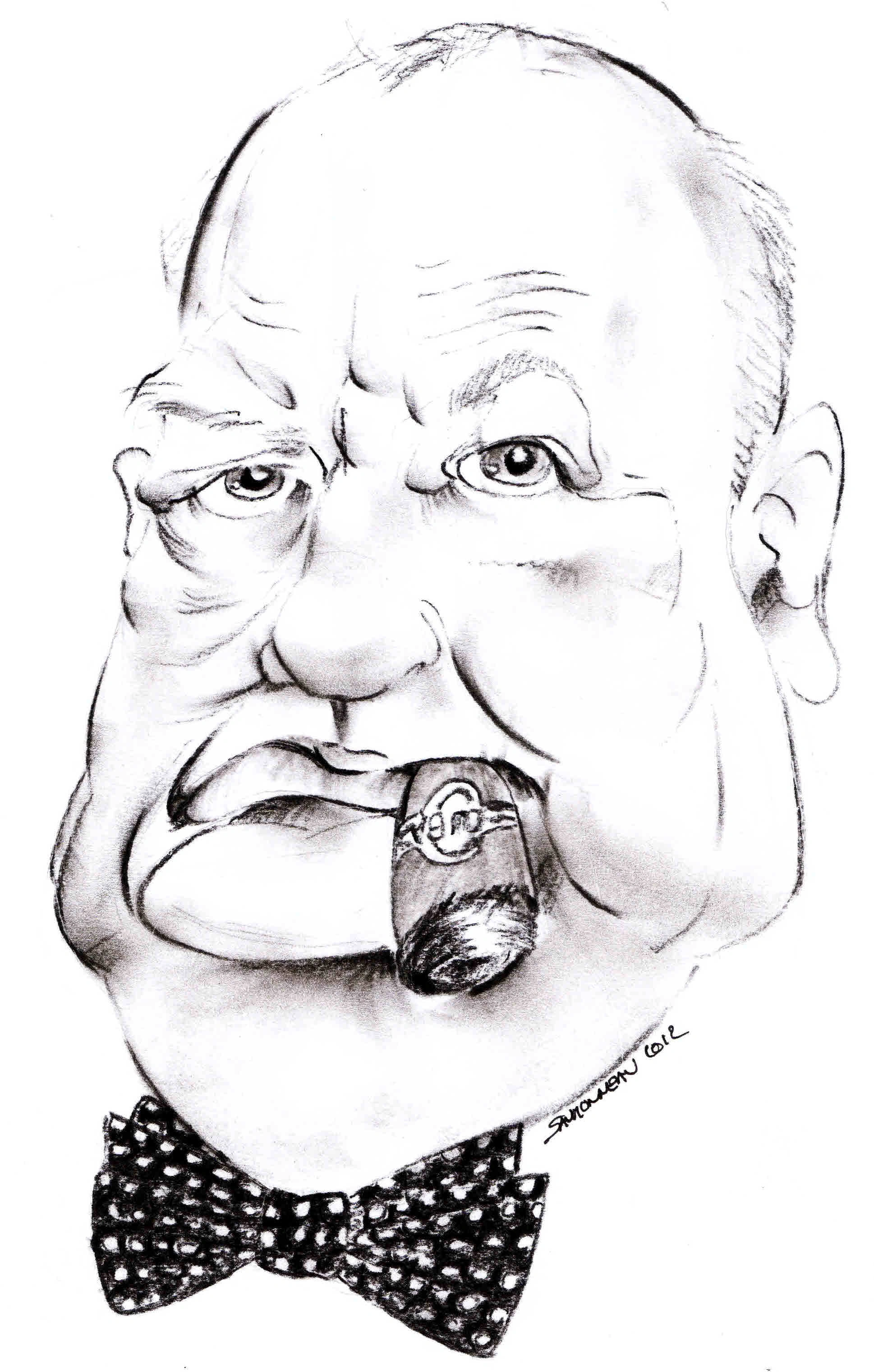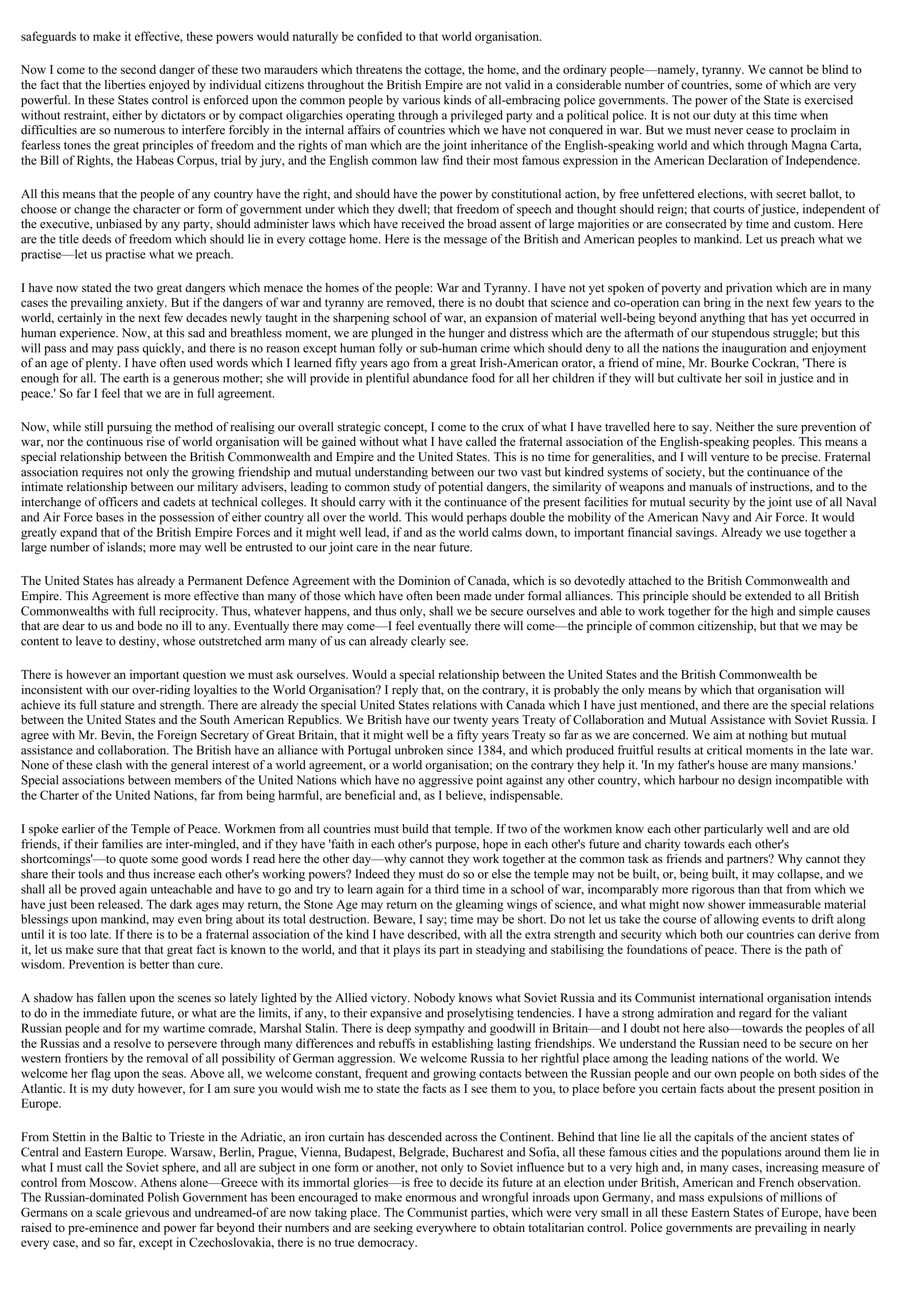Churchill: "The Sinews of Peace" On March 5, 1946, in a
Publié le 26/05/2013

Extrait du document


«
safeguards to make it effective, these powers would naturally be confided to that world organisation.
Now I come to the second danger of these two marauders which threatens the cottage, the home, and the ordinary people—namely, tyranny.
We cannot be blind tothe fact that the liberties enjoyed by individual citizens throughout the British Empire are not valid in a considerable number of countries, some of which are verypowerful.
In these States control is enforced upon the common people by various kinds of all-embracing police governments.
The power of the State is exercisedwithout restraint, either by dictators or by compact oligarchies operating through a privileged party and a political police.
It is not our duty at this time whendifficulties are so numerous to interfere forcibly in the internal affairs of countries which we have not conquered in war.
But we must never cease to proclaim infearless tones the great principles of freedom and the rights of man which are the joint inheritance of the English-speaking world and which through Magna Carta,the Bill of Rights, the Habeas Corpus, trial by jury, and the English common law find their most famous expression in the American Declaration of Independence.
All this means that the people of any country have the right, and should have the power by constitutional action, by free unfettered elections, with secret ballot, tochoose or change the character or form of government under which they dwell; that freedom of speech and thought should reign; that courts of justice, independent ofthe executive, unbiased by any party, should administer laws which have received the broad assent of large majorities or are consecrated by time and custom.
Hereare the title deeds of freedom which should lie in every cottage home.
Here is the message of the British and American peoples to mankind.
Let us preach what wepractise—let us practise what we preach.
I have now stated the two great dangers which menace the homes of the people: War and Tyranny.
I have not yet spoken of poverty and privation which are in manycases the prevailing anxiety.
But if the dangers of war and tyranny are removed, there is no doubt that science and co-operation can bring in the next few years to theworld, certainly in the next few decades newly taught in the sharpening school of war, an expansion of material well-being beyond anything that has yet occurred inhuman experience.
Now, at this sad and breathless moment, we are plunged in the hunger and distress which are the aftermath of our stupendous struggle; but thiswill pass and may pass quickly, and there is no reason except human folly or sub-human crime which should deny to all the nations the inauguration and enjoymentof an age of plenty.
I have often used words which I learned fifty years ago from a great Irish-American orator, a friend of mine, Mr.
Bourke Cockran, 'There isenough for all.
The earth is a generous mother; she will provide in plentiful abundance food for all her children if they will but cultivate her soil in justice and inpeace.' So far I feel that we are in full agreement.
Now, while still pursuing the method of realising our overall strategic concept, I come to the crux of what I have travelled here to say.
Neither the sure prevention ofwar, nor the continuous rise of world organisation will be gained without what I have called the fraternal association of the English-speaking peoples.
This means aspecial relationship between the British Commonwealth and Empire and the United States.
This is no time for generalities, and I will venture to be precise.
Fraternalassociation requires not only the growing friendship and mutual understanding between our two vast but kindred systems of society, but the continuance of theintimate relationship between our military advisers, leading to common study of potential dangers, the similarity of weapons and manuals of instructions, and to theinterchange of officers and cadets at technical colleges.
It should carry with it the continuance of the present facilities for mutual security by the joint use of all Navaland Air Force bases in the possession of either country all over the world.
This would perhaps double the mobility of the American Navy and Air Force.
It wouldgreatly expand that of the British Empire Forces and it might well lead, if and as the world calms down, to important financial savings.
Already we use together alarge number of islands; more may well be entrusted to our joint care in the near future.
The United States has already a Permanent Defence Agreement with the Dominion of Canada, which is so devotedly attached to the British Commonwealth andEmpire.
This Agreement is more effective than many of those which have often been made under formal alliances.
This principle should be extended to all BritishCommonwealths with full reciprocity.
Thus, whatever happens, and thus only, shall we be secure ourselves and able to work together for the high and simple causesthat are dear to us and bode no ill to any.
Eventually there may come—I feel eventually there will come—the principle of common citizenship, but that we may becontent to leave to destiny, whose outstretched arm many of us can already clearly see.
There is however an important question we must ask ourselves.
Would a special relationship between the United States and the British Commonwealth beinconsistent with our over-riding loyalties to the World Organisation? I reply that, on the contrary, it is probably the only means by which that organisation willachieve its full stature and strength.
There are already the special United States relations with Canada which I have just mentioned, and there are the special relationsbetween the United States and the South American Republics.
We British have our twenty years Treaty of Collaboration and Mutual Assistance with Soviet Russia.
Iagree with Mr.
Bevin, the Foreign Secretary of Great Britain, that it might well be a fifty years Treaty so far as we are concerned.
We aim at nothing but mutualassistance and collaboration.
The British have an alliance with Portugal unbroken since 1384, and which produced fruitful results at critical moments in the late war.None of these clash with the general interest of a world agreement, or a world organisation; on the contrary they help it.
'In my father's house are many mansions.'Special associations between members of the United Nations which have no aggressive point against any other country, which harbour no design incompatible withthe Charter of the United Nations, far from being harmful, are beneficial and, as I believe, indispensable.
I spoke earlier of the Temple of Peace.
Workmen from all countries must build that temple.
If two of the workmen know each other particularly well and are oldfriends, if their families are inter-mingled, and if they have 'faith in each other's purpose, hope in each other's future and charity towards each other'sshortcomings'—to quote some good words I read here the other day—why cannot they work together at the common task as friends and partners? Why cannot theyshare their tools and thus increase each other's working powers? Indeed they must do so or else the temple may not be built, or, being built, it may collapse, and weshall all be proved again unteachable and have to go and try to learn again for a third time in a school of war, incomparably more rigorous than that from which wehave just been released.
The dark ages may return, the Stone Age may return on the gleaming wings of science, and what might now shower immeasurable materialblessings upon mankind, may even bring about its total destruction.
Beware, I say; time may be short.
Do not let us take the course of allowing events to drift alonguntil it is too late.
If there is to be a fraternal association of the kind I have described, with all the extra strength and security which both our countries can derive fromit, let us make sure that that great fact is known to the world, and that it plays its part in steadying and stabilising the foundations of peace.
There is the path ofwisdom.
Prevention is better than cure.
A shadow has fallen upon the scenes so lately lighted by the Allied victory.
Nobody knows what Soviet Russia and its Communist international organisation intendsto do in the immediate future, or what are the limits, if any, to their expansive and proselytising tendencies.
I have a strong admiration and regard for the valiantRussian people and for my wartime comrade, Marshal Stalin.
There is deep sympathy and goodwill in Britain—and I doubt not here also—towards the peoples of allthe Russias and a resolve to persevere through many differences and rebuffs in establishing lasting friendships.
We understand the Russian need to be secure on herwestern frontiers by the removal of all possibility of German aggression.
We welcome Russia to her rightful place among the leading nations of the world.
Wewelcome her flag upon the seas.
Above all, we welcome constant, frequent and growing contacts between the Russian people and our own people on both sides of theAtlantic.
It is my duty however, for I am sure you would wish me to state the facts as I see them to you, to place before you certain facts about the present position inEurope.
From Stettin in the Baltic to Trieste in the Adriatic, an iron curtain has descended across the Continent.
Behind that line lie all the capitals of the ancient states ofCentral and Eastern Europe.
Warsaw, Berlin, Prague, Vienna, Budapest, Belgrade, Bucharest and Sofia, all these famous cities and the populations around them lie inwhat I must call the Soviet sphere, and all are subject in one form or another, not only to Soviet influence but to a very high and, in many cases, increasing measure ofcontrol from Moscow.
Athens alone—Greece with its immortal glories—is free to decide its future at an election under British, American and French observation.The Russian-dominated Polish Government has been encouraged to make enormous and wrongful inroads upon Germany, and mass expulsions of millions ofGermans on a scale grievous and undreamed-of are now taking place.
The Communist parties, which were very small in all these Eastern States of Europe, have beenraised to pre-eminence and power far beyond their numbers and are seeking everywhere to obtain totalitarian control.
Police governments are prevailing in nearlyevery case, and so far, except in Czechoslovakia, there is no true democracy..
»
↓↓↓ APERÇU DU DOCUMENT ↓↓↓
Liens utiles
- Robin George Collingwood, The Ides of History, 1946, Oxford University Press, 1994, p. 429 sv., trad. pers.
- Nelson Mandela's Inaugural Address Nobel Peace Prize winner and former political prisoner, Nelson Mandela, was elected president of the Republic of South Africa in April 1994 in the country's first multiracial elections.
- Breach of the peace
- Pax (Peace) Roman The divinity who represented peace.
- Eunomia (Order) Greek A goddess of order and lawful conduct and one of the three Horae, guardians of the seasons, with her sisters Dike (Justice) and Eirene (Peace).






